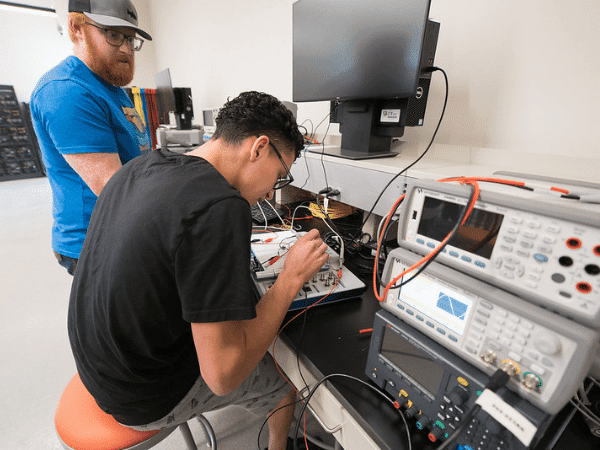Department of Electrical Engineering in Lahore offers a four-year undergraduate degree program in electrical engineering that focuses on the principles and applications of electricity, electronics, and electromagnetism. It prepares students for careers as electrical engineers, who design, develop, test, and maintain electrical systems and equipment.
The program typically includes coursework in subjects such as circuit analysis, electronics, electromagnetism, control systems, power systems, signal processing, computer engineering, communications systems, electromechanical systems, and electrical materials. Students also gain practical experience through lab work and may have the opportunity to participate in internships or co-op programs.
Upon completion of the program, graduates are prepared for a wide range of careers in industries such as manufacturing, power generation and distribution, telecommunications, and transportation, as well as research and development, consulting, and education. Some graduates may also choose to continue their education by pursuing a master’s degree or a PhD in electrical engineering or a related field.
Objectives of Bachelor of Electrical Engineering in Lahore
The objectives of a bachelor’s degree in electrical engineering typically include the following:
- To provide students with a strong foundation in the principles of electrical engineering and the mathematical and scientific knowledge needed to understand and apply these principles.
- To develop students’ problem-solving and critical thinking skills through the application of these principles to real-world problems.
- To prepare students for careers in electrical engineering or for further study at the graduate level.
- To provide students with the practical skills and experience necessary to design, build, test, and maintain electrical systems and devices.
- To expose students to the latest developments and trends in electrical engineering and to prepare them to be leaders in their field.

Role and scope of Bachelor of Electrical Engineering in Lahore
A bachelor’s degree in electrical engineering typically prepares students for a wide range of careers in the field of electrical engineering. Some potential job roles for graduates with a bachelor’s degree in electrical engineering include:
Electrical engineer: Design, develop, test, and maintain electrical systems and equipment.
- Systems engineer: Design, develop, and maintain complex systems that involve electrical and electronic components.
- Power engineer: Design and maintain systems for generating, distributing, and using electric power.
- Control engineer: Design and maintain control systems for a variety of applications, including manufacturing, transportation, and energy production.
- Computer engineer: Design and develop computer hardware and software systems.
The scope of work for electrical engineers is wide and varied, and can include anything from the design of small electronic devices to the development of large-scale power systems. Electrical engineers may work in a variety of industries, including manufacturing, power generation and distribution, telecommunications, and transportation. They may also work in research and development, consulting, or education.
Eligibility criteria for Bachelor of Electrical Engineering?
Eligibility criteria for a bachelor’s degree in electrical engineering typically include the following:
A high school diploma or equivalent: Most universities and colleges require applicants to have a high school diploma or equivalent in order to apply for a bachelor’s degree program.
Satisfactory grades in math and science courses: Electrical engineering programs typically require a strong foundation in math and science, so good grades in these subjects are important.
Standardized test scores: Many universities and colleges require applicants to submit scores from standardized tests such as the SAT or ACT.
Letters of recommendation: Some schools may require letters of recommendation from teachers, guidance counselors, or other individuals who can speak to the applicant’s academic abilities and potential as an electrical engineer.
A personal statement or essay: Many schools require applicants to submit a personal statement or essay as part of the application process. This is an opportunity for applicants to explain their interest in electrical engineering and why they believe they are a good fit for the program.

Major Subjects of Bachelor of Electrical Engineering
The major subjects that are typically covered in a bachelor’s degree program in electrical engineering include:
- Circuit analysis: The study of how electricity flows through different types of circuits and how to analyze and design circuits using various techniques and tools.
- Electronics: The study of electronic devices and systems, including transistors, diodes, and integrated circuits.
- Electromagnetism: The study of the relationships between electricity, magnetism, and electromagnetic fields.
- Control systems: The study of systems that use feedback and control to maintain a desired state.
- Power systems: The study of the generation, transmission, and distribution of electrical power.
- Signal processing: The study of techniques for analyzing, modifying, and synthesizing signals such as sound and images.
- Computer engineering: The study of computer hardware and software design and development.
- Communications systems: The study of systems that transmit information over distances, such as telephone systems and wireless networks.
- Electromechanical systems: The study of systems that involve both electrical and mechanical components, such as electric motors and generators.
- Electrical materials: The study of the properties and characteristics of materials used in electrical and electronic devices, such as semiconductors and insulators.
Current salary of Bachelor of Electrical Engineering in Lahore
It is difficult to provide a specific salary range for a bachelor’s degree in electrical engineering, as salary can vary widely depending on a number of factors such as location, industry, company size, and the individual’s level of education and experience.
According to the United States Bureau of Labor Statistics (BLS), the median annual wage for electrical engineers was $98,530 in 2020. Electrical engineers with a bachelor’s degree may start out at a lower salary and then receive pay increases as they gain experience and take on additional responsibilities. Some electrical engineers may also choose to further their education by obtaining a master’s degree or a PhD, which can also lead to higher salaries.
It is important to note that salary is just one factor to consider when deciding on a career path. Other factors such as job satisfaction, advancement opportunities, and the job market in a particular location should also be taken into account. Read more here!

